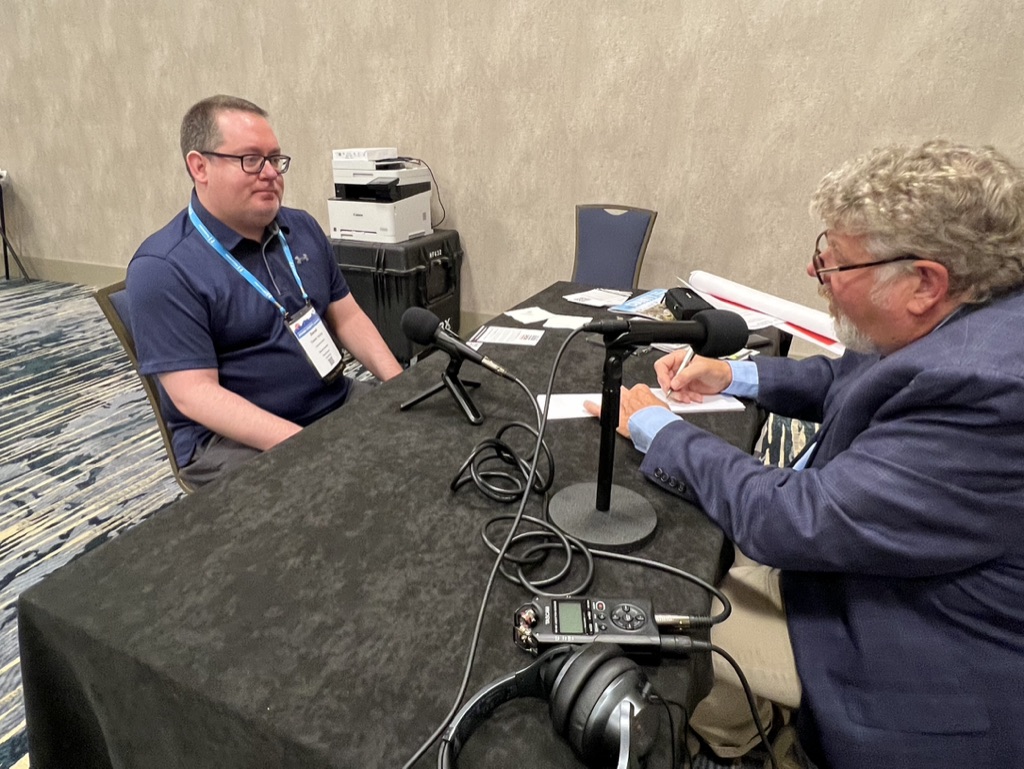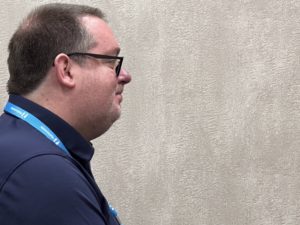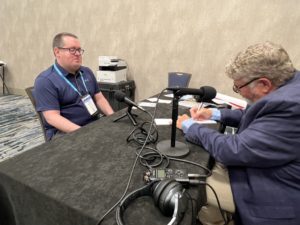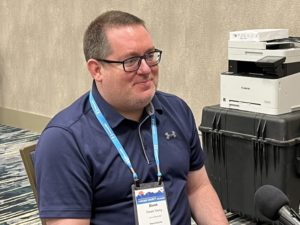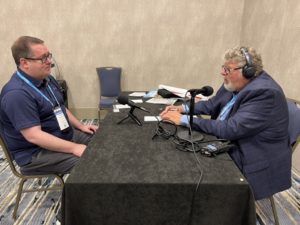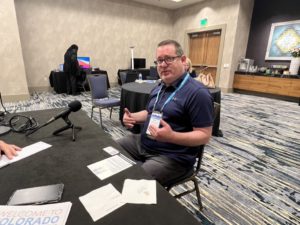Host, David Martin sat down with Pierce County Council Member Derek Young at the annual National Association of Counties conference as part of a series of conversations with those in and around county government. Our own Good Government Show questionnaire.
Helpful Links:
Thanks to our sponsors:
A Conversation with Pierce County Council Member Derek Young Transcription
David Martin: This is the good government show.
Derek Young: You can have the smartest policy in the world if you haven’t done the work to bring the community behind it. It’s not going to work out or it rarely does. So governments very often like it, especially in a democracy. It’s going to be a little messy because you have to bring people along with you. I think it’s important for people to, one, stay engaged.
And that means, yes, getting your local newspaper, you’re paying attention to local media, whatever you have there. Because unfortunately, one thing about local government is that the way we used to communicate when I first was on the city council has completely unraveled and it’s very different now. So it’s hard for us to communicate. As a result, they need to be proactive and they need to be subscribing to your local leaders newsletters, you know, to the to the governments, social media, whatever.
And while you’re monitoring that, be thinking about what you want them to accomplish and see if they’re addressing those things.
David Martin: Welcome to the good government show and a Good Government Show Extra. I’m your host, Dave Martin. I recently attended the National Association of Counties Annual Conference. This is where many of the nation’s county officials gather to share ideas, set a course for the coming year and promote good government. I talked to many county leaders and asked them to define what good government means to them and how they measure their success.
Here on this special edition of the Good Government Show, Are there answers? It’s our own good government show questionnaire. So for this episode, I was reaching all the way across the country, and I sat down with Derek Young. He’s a member of the Pierce County Council in the Tacoma, Washington area. And his story of getting into politics is small.
It’s inspiring. And I’ll be back with that story in just a minute.
The Good Government Show is sponsored by NACO. That’s the National Association of Counties County Government is actually the oldest form of government in the in the United States and touches more people directly. Think about it. Roads, highways, hospitals, schools, recycling, law enforcement, water and sewers. In most of the country, those services are maintained by the county. That’s county government. NACO is a nationwide organization and they represent all 3069 counties across the USA. NACO helps county government work better together, do things like sharing best practices and as we see in this and other episodes, when county government works well, well, that’s just good government. The Good Government show gets many of our stories from NACO. So thanks for the stories and thanks NACO for working to support good government.
The Good Government Show has a new sponsor, OurCo. That means our community. OurCo find a way to make county government and change makers even more effective. The folks at OurCo provide a platform that blends in-person and digital interactions to connect people in a more human way. The mobile app transforms meaningful conversations and reliable data into actionable insights that inspire positive change.
It’s sort of like a flash poll. Want to know if the community would rather have a dog park or a bike trail? OurCo can get you an answer immediately. Engage your citizens, groups and officials.
Learn their wants and needs. Build trust and build programs and policies that advance your county, your job creators, and your constituents. Visit ourco.com.
That’s ourco.com to learn how they do it. And while you’re there, book a demonstration. Thanks, OurCo. Thanks for coming on board the good government show.
Welcome back to the Good Government Show. If you like what you hear, then please like us and follow us on Facebook and Twitter and rate the podcast on the platform where you’re listening. Now your comments help us continue to tell these great stories and of course, listen to season two of the good government show. Now, here’s my conversation with Derek Young.
Welcome to The Good Government Show. I’m David Martin. I’m your host. And I am here at the National Association of Counties Conference, where we are talking with various county officials. And right now we are talking with Derek Young, who is a council member from Pierce County in Washington, which is the Tacoma area. Is that correct? Correct. Welcome to the show.
Thanks for coming. Thanks for talking with us.
Derek Young: Thanks for having me.
David Martin: You’re welcome. So a little bit different in your in your county, the form of government. Could you describe how your what your title is and how your government set up?
Derek Young: Sure. So I’m a chair of the Pierce County Council. So I’ve known as a council member. And we’re essentially the legislative branch of county government similar to the legislature or Congress. We also have an elected executive, which is similar to governor or president, so similar in other forms of government, but different than a lot of the county commissioners and supervisors you see out there.
David Martin: So we just talked a little bit about this. And I want to I want to ask you again, your start in politics was a little unusual. You started young. Can you just tell me how that happened and why it happened?
Yeah. So in 1997, I was 20 years old. Our young environmentalists excited about something called the Growth Management Act that was passed in Washington.
David Martin: You wanted to change the world.
Derek Young: And I wanted to change the world. And being young and foolish, I certainly thought I was the one to do that and probably had more of more ambition and than sense. But quite frankly.
David Martin: The time to have it. Yeah, exactly. Exactly.
Derek Young: Yeah. It’s and to be honest, I did not expect to win. It was more to prove a point I did not like. Some of the land use environmental practices of my town. It wasn’t embracing this Growth Management Act.
David Martin: And you say growth manager, what was the issue?
Derek Young: Yeah. So it’s it basically means that the towns and cities need to accept growth and, you know, from the population, if we want to protect the rural lands, otherwise you get sprawl. And so my town was basically saying no. And what was happening outside is we were getting lots of sprawl and destroying lots of habitat and lots of farmland.
David Martin: And your town? You’re from the Tacoma area where we’re.
Derek Young: I’m sorry. Gig Harbor, Washington. Yeah.
David Martin: So just describe the town.
Derek Young: It’s a it’s a small town. Used to be very small when I was a kid. And it’s just across the bridge from Tacoma Narrows, from the city of Tacoma, though, you cross, that’s common errors. Many people are aware of this bridge because of the old video from back in the thirties of the one that fell down. You know, it’s called a galloping gurdy because I have this kind of weird, wavy motion.
And if you’re an engineer, you’ve seen it a million times in your college classes. And so it started out as primarily a fishing community. You know, it’s this around this protected little bay, okay, very picturesque kind of area. And so tourists and other people discovered it and figured out, wow, this is a beautiful place. And so it’s growing leaps and bounds.
But the yeah, I mean, really the issue for me was, you know, making sure that we were doing our part to deal with this growth that our whole region.
David Martin: So addressing it in smart growth.
Derek Young: Yeah, exactly. Smart growth is exactly it. And so because we had this weird inside out development pattern, it was like the worst of all options. You don’t you want to have more growth in the city and as little as possible in the more rural areas. Unfortunately, that’s not what was happening. So I decided to run basically because I saw the other you know, the incumbents were going to be unopposed.
And and to my surprise, and I think everyone else is I managed to win. I will say.
David Martin: No, let’s let’s slow down right there. Now, did you run a real campaign? Did you get out and did you have volunteers and did you work at.
Derek Young: We did. The we actually worked it really hard. I think that’s probably how we won was, you know.
David Martin: You have all your 20 year old buddies helping you out and your parents.
Derek Young: Would say it was more the older demographic that was for helping me out. Yeah.
David Martin: Do they think it was a lark like, oh, look at this kid.
Derek Young: Oh, my friends definitely thought I was a little out of my mind. My parents definitely did. They they when I told them I had filed, they were just like, what? And but, you know, I think there were a handful of people early on that saw what we were trying to do invested in the campaign. Yeah. So we had some money to do, you know, print leaflets and fliers and such.
And I just started dawdling the heck out of my town and visited at every door at least once. Yeah. You know, we came back and tried to hit the ones that we missed. You know, we didn’t catch anybody later on and. And, yeah, ran a real campaign. It was in fact, it was probably the first kind of serious campaign the town had seen in terms of the amount of work that went into it.
David Martin: As a results. You were a city councilman.
Derek Young: Yes.
David Martin: And how long do you serve for?
Derek Young: 16 years.
David Martin: Wow. Yeah. And now tell me about your kind of commission campaign. What was the evolution?
Derek Young: Yeah. So towards the end of my time on the city council, and to be honest with you, I hadn’t planned to the state for, you know, four terms the time as.
David Martin: You’ve never really had a job since you got out of college.
Derek Young: Yeah well the been in. Well that’s a very part time council gig so I guess I had other employment. Okay. But the full time with the staff. Yeah. No, no. That night that had to get to the county government before any of that. Okay. But yeah, the, the recession came around the Great Recession and our budget was just a mess and I felt weird stepping away.
So I ended up running for that one more term to try to help out and, you know, kind of dire times. And then towards the end of my term, I had not planned on running for another office. But notice, again, related to land use and environmental issues, some differences that I had with the incumbent, that we represented us on the county council.
And so for the council, we’re…
David Martin: So you’re like a professional newage.
Derek Young: Yeah, exactly. Yeah. Basically, the the deal is that the council’s divided up into districts and so we are represented by one member and and that member was, you know, different views on land use, environmental issues. So it most of it came out he was running for Congress at one point. And so I’d seen, you know, videos, you know, of things that that he was saying.
And so yeah. So I decided to to take another crack at running for office and and we were successful again, again, very narrowly. He was okay through a lot of hard work and got.
David Martin: There as a councilman. Understand that you’ve been pretty active in the health care and looking into health issues. What prompted you to get involved? And you’re not a doctor. You have no health background. What prompted you to get involved in that?
Derek Young: Yeah, it’s really that public health in particular is is less the medical stuff that we think about. In fact, a very small portion of what we think of as, ah, you know, the population health is in the health care itself. The fact it’s mostly determined by what we call social determinants, it’s income, it’s education, it’s where you live, it’s environmental factors, it’s lots of different things that come together to really make predictions about how you know, how you’re going to live your life.
And I noticed how much of it was similar to sort of basic land use practices and trying to build strong, sustainable communities. So for example, you know, if you’re don’t live in a walkable neighborhood, you’re probably not going to walk a lot. And so we we have to kind of put good planning and good public health into the same bucket.
And once I got into it, then it was like, well, all of this is really interesting. And, you know, we have an infectious disease division and, you know, environmental health covers a lot. Know I represent a large number of rural areas and so they have septic and water issues. And so public health covers those things.
David Martin: So a lot of on the job learning. Yeah.
Derek Young: Yeah, that was exactly I really just was interested in the policy through myself at it and realized that this is this is really important work. And then of course, the pandemic comes around and it’s like, okay, this isn’t what I signed up for, but it’s the job you have, whether you like it or not. Right. And so it’s time to, you know, figure out what we need to do to respond to the pandemic.
David Martin: What else you’ve been working on.
Derek Young: All right. So a few things. I like working on justice issues because I see, again, it’s kind of tightly connected to a lot of other health issues, behavioral health in particular. Yeah. So both on the mental health and substance use side, I convened our opioid task force to deal with that epidemic as it was emerging in our community and and then transportation policy.
I’m, I’m a big transit nerd. It’s trying to improve transit and how do you to work mostly transit although transit. Yeah I will say more recently it’s been more difficult because the pandemic really cut our workforce. And so the predictability of our my bus in particular, because I live in a smaller community that doesn’t have a frequency, I’ve had to drive a lot more than I that I prefer because it’s I got to make sure that I get the work if they’re going to cancel a bus.
But, but yeah, before that, I mean, I was almost exclusively a bus rider.
David Martin: How do people react to seeing their councilman on the bus?
Derek Young: Oh, we’re pretty anonymous. At my county level of government. It’s I would say it’s not that common that I other than like the regular commuters. Yeah. You know, when you when you’re on a roll like that, you’re sort of a little community so everyone knows each other, okay? But it’s outside of politics. It’s they know me as Derek, but every once in a while, someone will see me and get a little surprised.
And and I always tell them, like, you know, regular people, too. It’s not a, you know, so I’m here the same reason you are. And it’s a good way to get around.
David Martin: So I have some questions I want to ask. I’ve asked a few people here at the convention and I want to run some of these by you. I was you were you were described to me as young and dynamic. So here you go. This is your chance to prove it.
Derek Young: I think it’s just because of the name. Like they’re just, you know, saying, oh, he’s he’s literally young, but he’s literally young.
David Martin: So you’re not really young. You’re just David’s young. So tell me, what is good government to you? What’s your definition of good government?
Derek Young: To me, it really is one, it’s about good policy that’s, you know, most important. But it’s also about bringing people together. You know, if you can be, you know, the you can have the smartest policy in the world. If you haven’t done the work to bring the community behind it, it’s not going to work out or it rarely does.
So governments very often like it, especially in a democracy. It’s going to be a little messy because you have to bring people along with you. So to me, good government is a is a mix of those two things.
David Martin: How do citizens, the people that you serve and people across the nation, I mean, how do they know if they’re getting effective, good government from their leaders?
Derek Young: That’s tough because it’s it’s really up to everyone’s judgment. I think to me, it’s you know, you can look at it now comes just systems and how they’re how they’re working. People know, for example, you know, we brought up transit transit in my community, quite frankly, it’s kind of broken and it’s for a variety of reasons. Yeah, you don’t have to be a policy expert to notice that people that depend on transit or choose to ride it can tell you the difference between our system and ones in other areas that’s working better.
So.
David Martin: And how do they bring that up to you?
Derek Young: Oh, usually with an angry phone call or email or just, you know, I think they also tend to understand that some of these things are hard. You know, part of the reason that we our system isn’t working well is because the state gives a certain amount of authority, taxing authority to fund our local transit. We sailed past it, did the full amount, and it’s also based on relative wealth.
So the unfortunately, because it’s local localized, the richer areas spend more in sales so they get more sales tax and so they get better service. It’s a weird way to do things, but that’s why people expect me to go down to the legislature and tell them, Fix this. So sometimes I’m the constituents going to the legislators.
David Martin: How do you know if you’re being effective? What’s your personal yardstick or how do you measure your success or lack of success?
Derek Young: Yeah, it’s I think you can see when, you know, sometimes it’s hard to see in the moment because incremental change in particular, which is a lot of local government, it’s hard to see those little movements as they’re happening. But if you are able to take a step back and look at where you were eight, ten years ago, that’s a little easier.
And I think that’s one thing about having some longevity like I have that I can look back and say, we’ve really moved the needle. The other part that I would say is, you know, if you’re winning every vote by a you know, just a bare majority, you know, that’s not what success looks like either. You may have won that vote, but by not bringing others along to build more consensus that success may be short lived.
David Martin: So what should people know are? What should people look for to decide if they’re their leaders and their government is is effective and their and they’re giving their delivering on their promises and delivering good government.
Derek Young: One, I’d be careful to anybody that’s promising.
David Martin: Okay?
Derek Young: Because, because you never know the situations that you’re going to be in. I like I’ve always told people, I’ll tell you what I’m going to try to work on and I’m going to tell you what my values are, but I’m not going to promise you anything because if I do, there’s a really good chance it’s out of my control and I won’t be able to to accomplish those things.
But, you know, I think it’s important for people to, one, stay engaged. And that means, yes, getting your local newspaper, you’re paying attention to local media, whatever you have there. Because unfortunately, one thing about local government is that the way we used to communicate when I first was on the city council has completely unraveled and it’s very different now.
So it’s hard for us to communicate as a result. They need to be proactive and they need to be subscribing to your local leaders newsletters, you know, to the to the governments, social media, whatever. But while you’re monitoring that, be thinking about what you wanted them to accomplish and see if they’re addressing those. It may not always look exactly the way that you wanted it to, but at least they’re addressing it and trying to build consensus around those issues.
David Martin: So it may be, I think what you said there was you may not agree with what they’re doing, but at least they’re doing something. And that’s one way to tell if they’re actually working on the issues.
Derek Young: Yeah.
David Martin: Okay. So if people feel like they’re not getting good government, if they seem like their leaders aren’t effective, what could they do and what should they be doing?
Derek Young: Step one, let those leaders know because, you know, there are times when, you know what, we all have issues that we’re very passionate about and we have a pretty firm grasp of what we want to do. Yeah, there’s a lot of times that we’re learning from the public what we should be doing for the folks that we represent.
So, for example, I don’t live in a in a rural area myself, but I represent a huge number of people who do. And so I need to learn a lesson from them. And so if your leader is not not doing that, you know, you need to to get in their ear. The next step, quite frankly, is to do what we’ve talked about earlier.
And it’s go ahead and get on the ballot yourself, you know, running for local office is a lot easier than people think. You know, typically the barrier to get on the ballot is lower. The amount of investment it takes to run a campaign and what people are going to expect to small. So I tell people, you know, one, there’s too many unopposed incumbents in local government.
I’m not saying every incumbent needs to be tossed out in their year, you know, but there’s a lot of hardworking people out there. Yeah, but there are more people that are unopposed than there are people who really deserve to be unopposed.
David Martin: You started it, you said 20.
Derek Young: You just got out of college graduate. Yeah, I just come back home from Seattle and and that basically my part of town where I grew up was was recently annexed into the city.
David Martin: All right. So you’re a rather young person. Yeah. And idealistic. And, you know, you wanted to change the world and change what was happening, that what you saw in your community. What would you tell someone who feels the same way, who wants maybe wants to get into politics and is a, you know, a young activist or a young interested person?
Derek Young: So I don’t always advise people to take the same path I did.
David Martin: Well, you were successful.
Derek Young: I was successful. That’s that’s relatively rare.
David Martin: But loss early on, it’s not a bad thing.
Derek Young: But it’s sort of our jumping in the pool to learn how to swim as well, I’ll put it that way. So, you know, I wouldn’t I would never discourage young people to do it. In fact, one of the things I’ve done over the last 24 years is make sure that I try to encourage and and mentor people coming behind me because I think that’s part of my job.
But I also say there’s a way to sort of wade in and find out what you’re interested in and see if it fits, what you’re wanting to do. And that’s there are is literally hundreds of advisory boards and commissions that you could volunteer for at the city, the county and the state level. So I encourage people, you know, if you’re not sure that this is for you, get engaged with one of those.
And that’s a place where you can already give have some influence in those decisions. You know, there’s lots of different interest areas, so you can bring your expertise to it and then you can also decide, you know, maybe this isn’t for me or maybe this is for me. And people who have that kind of background are more likely to be trusted by voters.
You know, they’ve seen you’ve got some experience, right? So I had no resume. That’s why I say it was it was maybe not the best path. And it came up frequently during the campaign. So all I had to sell on was basically my values and that I was going to work hard. And so I think.
David Martin: That came or knocked out a lot of doors.
Derek Young: And I knocked on a lot of doors. But the but in terms of if you want to build that resume and show people that, hey, you know, this person’s interested in improving our community, they spent time on our planning commission or or, you know, the Human Services Advisory Board or or our Parks Commission, whatever. That shows some dedication and interest.
Derek Young: It gives you a little experience in how to work with the body and and you can, you know, basically prove yourself.
David Martin: You’ve said this a couple of times. Democracy is messy. Government is messy. What would you like people to know about the inner workings of government, about what’s going on behind the scenes?
Derek Young: There is a there is a conception that that in especially in local government and I don’t know why, but because, you know, for most of us, transparency is like a of our like it’s literally law, you know, so we’re doing most of our work out in the open. But there’s this belief that government has this sort of monolithic view of what to do.
And so people would refer to all the government. Of course, they did this. Well, what you’re not seeing is that there was a lot of discussion and back and forth and dissention in some cases very much agreeing with your positions. So I think people would tend to view us as all the same, and that’s very much not the case, at least in my neck of the woods, you know, we have a lot of split votes.
David Martin: And we always try to wrap this up on a positive note. Give me your example. One of your favorite examples of good government working.
Derek Young: So one of my favorites is so the reason I’m an environmentalist versus when I was a kid, we moved from Indiana to Washington, Puget Sound area. And if you don’t know if you in town, it’s, you know, this large inlet kind of like the Potomac area, and it has some unique species of of of animals, one of them being orcas.
And I was obsessed with these just amazing animals that you get to see right off the shoreline from this narrow little place. Orcas, whales. Yeah, well, well, sure. Whales.
David Martin: Killer whales.
Derek Young: And and and as a result, I got kind of obsessed with them. The problem is that all of us moving to this area was destroying the fish that they survive on. So we both lost our salmon because we’ve destroyed their upland habitat. We’ve polluted the bay. And then also the orcas, you know, they don’t have enough to eat.
So their populations have been wallowing. They’re starving. One thing that we’ve seen in recent years is a number of policy changes to reverse that trend, and we’re starting to see some success there. So we’re removing culverts, barriers for fish to get back upstream. What we’ve paved over with a road, we’re starting to see development pull away from from rivers and also see the restoration of rivers to their natural form.
All of those things are basically bringing fish back to where they didn’t used to be. And as a result, we’re going to save the organs.
David Martin: Save the orcas. There you go. Derek Young of Pierce County, Washington, thank you so much for stopping by. Good, good conversation. Good to have you. Good to meet you.
Derek Young: Thank you.
David Martin: That was Derek Young, a friend of orcas and someone we hope stays in government. Join us again for the good government show extras and for season two of the Good Government Show. I’m Dave Martin. Thanks for listening.
Thanks for listening. If you like our show, please tell your friends to listen, too. Follow us and like us on Facebook or follow us on Twitter and be part of the conversation. And please give us a five star rating right here when you’re listening to this podcast. Your support helps us continue to tell stories of good government in action.
For extras on all of our shows, visit our website, goodgovernmentshow.com.
The Good Government Show is produced by Valley Park Productions. Jim Ludlow, David Martin and David Snyder are the executive producers. Jason Stershic is our producer and editor. Some transcriptions were done by Kofi Ajeasi Ampah. Our hosts are me, David Martin and Carol D’Auria. Join us again for the Good Government Show, wherever you listen to podcasts.

